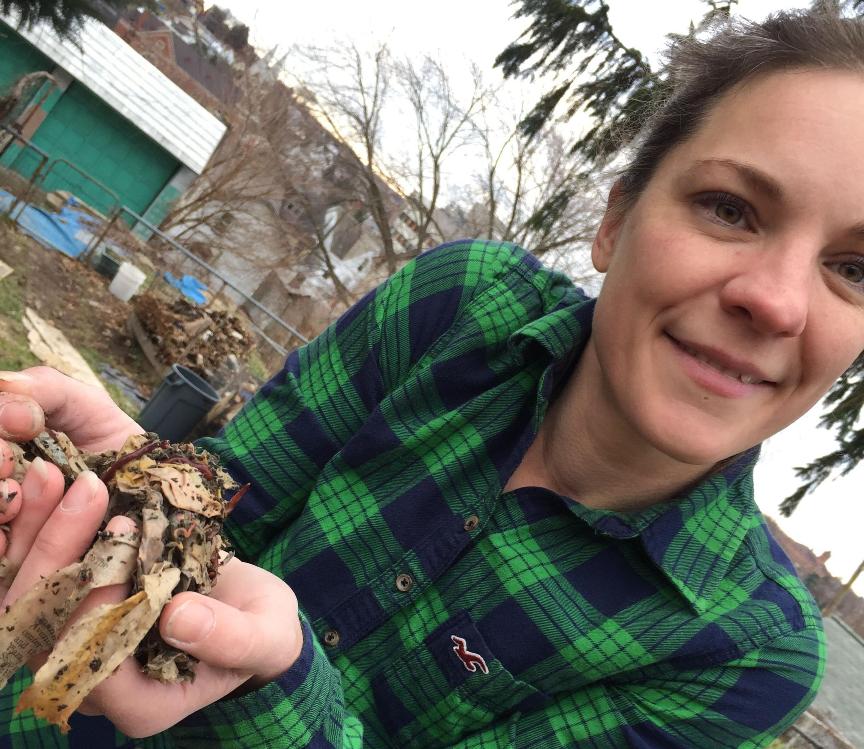Laura Codori learned about interest-free, microloans offered through the online platform Kiva five years ago when she was trying to start her composting business, Worm Return.
But she hesitated to seek money from lenders she didn’t know in the global cyber universe until she was sure she could put their dollars to good use.
Worm Return collects food scraps and other organic materials from households and commercial sites including restaurants and then processes the material into compost used primarily as garden fertilizer. It specializes in vermicomposting in which worms are added to the process to create compost rich in nutrients.
When Codori found a spot in Pittsburgh’s Allentown neighborhood to house some of her operations, she submitted a request for her first $5,000 Kiva loan and used the funds to acquire the property.
Earlier this year, Codori sought a $15,000 Kiva loan for a new vehicle to transport her compost buckets and other materials.
That loan was funded in just over a week.
“It was such a humbling experience to see how much people believe in what I’m doing,” Codori says.
Like Codori, Kiva borrowers are typically entrepreneurs seeking early startup funding or money to expand. Many are minorities and other underserved populations who may have challenges working with banks to get funding; Kiva does not require a minimum credit score.
Codori is among the entrepreneurs Kiva Pittsburgh is highlighting as part of a push to generate loans for locally-based businesses from local lenders.
The Lend Local Pittsburgh initiative rolled out in February and to date, 19 funders have made 45 loans totaling nearly $21,000. Recipients include a local market, a doula coaching business and an HVAC company. Lend Local members can track the team’s activity online and communicate with each other about their investments.
Worm Return sought Kiva funding before the Lend Local platform launched and received loans from individuals as far-flung as Germany and Australia.
Emily Keebler, Kiva Pittsburgh program director, envisions Lend Local as a way to create a team of Pittsburghers who invest specifically in Pittsburgh-based entrepreneurs.
“It’s a way to support and get the word out about these local businesses,” Keebler says.
The Lend Local campaign was rolled out through social media promotions in conjunction with Kiva Pittsburgh reaching the $2 million mark in total crowdfunding since it launched here in 2014.
Kiva loans range from $1,000 to $15,000 and lenders must loan a minimum of $25. Loans have a 96 % repayment rate, according to Kiva’s San Francisco-based parent organization, which was founded in 2005 and facilitates funding for small businesses worldwide.
The $2 million in loans generated by Kiva Pittsburgh benefited 340 firms in the region and was generated by 26,000 Kiva lenders locally and elsewhere, says Keebler. The average loan size is about $6,000.
Of the total recipients, 63 % of the businesses are women-owned and minorities own 62 %.
“Obviously every loan is important,” says Keebler. “We’re helping businesses access capital. The total $2 million is a lot to help small businesses and have lives changed by getting a business off the ground or to its next step in growth.”
Kiva recently partnered with local small business lender Bridgeway Capital and Sustainable, a local firm that offers business model assessments to entrepreneurs and startups, to provide assistance to 22 Kiva borrowers.
For much of the Covid pandemic, Kiva suspended in-person meetings with borrowers but was able to process applications and offer consulting online and over the phone, says Keebler.
Requests for Kiva funding soared beginning in March 2020 when the virus forced many businesses to shutter or drastically alter their operations.
“Many calls were from people worried about taking on more debt because they weren’t sure they would reopen,” says Keebler. “But as vaccines came in sight and folks felt like they would make it through, there was a huge surge for applications for existing or new businesses.”
To help firms worried about surviving the pandemic, Kiva increased its maximum loan amount from $10,000 to $15,000.
Kiva Pittsburgh is housed at the Riverside Center for Innovation, a North Side nonprofit that operates a small business incubator and focuses on programs for women, minorities, veterans, LGBTQ individuals and others who may be underserved in obtaining financing and assistance.
In addition to its Kiva funding, Worm Return received a loan of approximately $18,000 from the city’s Urban Redevelopment Authority.
Codori values “the community aspect” of her Kiva funding.
“These personal lenders really helped show my credibility,” Codori says. “If I can’t repay the debt, I have pretty much lost my credibility with people who believed in me.”



